Opinion
UN Resident Coordinator’s missive to PM and what an ordinary Sri Lankan thinks about it
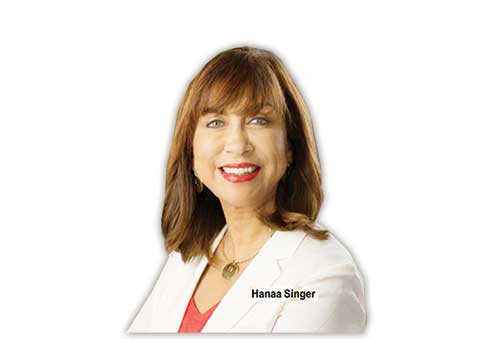
By Rohana R. Wasala
UN Resident Coordinator Ms Hanaa Singer’s outrageously meddlesome missive offering unsolicited advice on governance (November 12, 2020) to Prime Minister Mahinda Rajapaksa, with copies to the Minister of Foreign Relations Mr Dinesh Gunawardane, and Minister of Health, Nutrition and Indigenous Medicine Pavithra Wanniarachchi hasn’t still elicited an official response from the Government; neither has it drawn any comment from the Opposition, at least by the time of writing. But concerned Buddhist monks and lay activists and other ordinary citizens who really care about the country, active in the social media, have already expressed strong disapproval of what they consider to be her brash overstepping of the legitimate boundaries of diplomatic protocol relating to her job in Sri Lanka as an employee of the United Nations. They are within their rights for they are the well informed nationals of the democratic Sri Lankan state, where every citizen has an inviolable claim to a share in its sovereignty, and can question the legitimacy of words and actions of a non-citizen of whatever capacity who seems to dictate terms to the least of them, let alone to those lawfully and democratically elected to execute sovereign power on behalf of all the citizens.
Ms Hanaa Singer is the most senior UN official in Sri Lanka. When she presented her credentials to the then president Mr Maithripala Sirisena in September 2018, she assumed duties in a dual capacity as UN’s Resident Coordinator and UN’s Development Programme Resident Representative for Sri Lanka. However, as a result of a UN reform process in January 2019, the second job was given to another UN functionary, and since then Ms Singer has held only the key post of UN’s Resident Coordinator for Sri Lanka. In that capacity, she leads the UN Country Team of 22 Resident and Non-Resident UN Agencies. She represents the UN Secretary-General in Sri Lanka.
Before her assignment to Colombo Ms Singer held a number of senior managerial positions in the UNICEF offices across the globe, particularly in Asia and Africa. She was Associate Regional Director UNICEF Geneva; she was Country Representative for UNICEF in Syria, Nepal, Kazakhstan and Azerbaijan. Ms Singer also led humanitarian programmes in Burundi and Haiti, and managed cross border operations including those to Afghanistan and Iraq. Ms Singer claims nearly thirty years of experience with the UN. As she comes from Egypt, she may be expected to be familiar with the problem of Islamic extremism that is plaguing the whole world. An estimated 90% of Egyptians are Muslims, and most of them are Sunnis, with a small minority of Shia Muslims, and an even smaller minority of officially unrecognized Ahmadis.
Until recently, the majority of the mainstream traditional Muslims used to be Sufis who were sufficiently, almost seamlessly, integrated into the very tolerant Buddhist and Hindu cultural communities. Unfortunately, that peaceful religious coexistence is being threatened by the recent incursions of Salafist and Wahhabist extremists allegedly sponsored by Sunni Islamist Saudi Arabia. The 2019 April Easter Sunday church and hotel bombings which killed over 250 and injured more than 500 innocent men, women, and chidren, leaving some maimed for life, were carried out by some young Muslim suicide bombers who had been indoctrinated and trained by these extremist ideologists. There is a danger of such extremists exploiting the volatile sensitivities of sorrow stricken Muslims in this Covid-19 situation who, like people of other religions, are in need of emotional succour and are looking towards the traditional source that provides it.
While expressing her/UN’s readiness ‘to provide any relevant support on this matter’ (the burial problem), Ms Hanaa Singer tells the PM that ‘dignified handling of bodies of persons dead of Covid-19 virus has been an important part of the COVID-19 response’ (as if he is unaware of this). What material support can she provide on the burial matter? She reiterates ‘the concern of the United Nations with the existing Ministry of Health guidelines which stipulate cremation as the only method for the disposal of bodies suspected of COVID-19 infection’. Why should the UN be ‘concerned’ about the Health Ministry guidelines which order the cremation of bodies of persons scientifically confirmed dead of COVID-19? It is not a case of disposing of bodies ‘suspected of COVID-19 infection’. Ms Hanaa’s ‘concern’ reveals her unfounded suspicion that the government is abusing this situation to discriminate against Muslims. The government and the rest of the population have other prob;ems to worry about.
Ms Singer refers to WHO circulars issued on March 24, 2020 and later the claim that ‘…..based on current knowledge of the symptoms of Covid-19 and its main modes of transmission (droplets/contact), the likelihood of transmission when handling human remains is low….’. This sort of harebrained wisdom, though it comes from the WHO (which is also manned by ordinary mortals), is unacceptable in a lethal situation. Let’s take a domestic example. Suppose you have a child who is allergic to peanuts, and that once, feeding him a peanut containing yoghurt almost killed him. Now, a friendly visitor brings him a chocolate. But before giving it to him you check whether it is safe for him, so you look at the wrapper and read the cautionary information printed there: it says ‘This product may have traces of peanut oil’. Will you allow your child to eat the chocolate? No, at all. Why expose your child’s health, or even his life to danger for the sake of a chocolate? In the current pandemic situation, while obeying the broad WHO guidelines, each country must adopt measures that best suit local conditions as determined by qualified local experts, not by interfering politicians or diplomats. Burial of infected bodies in the current situation is dangerous because of its potential for contamination of the aquifers, which, in most parts of the country are quite shallow. In Sri Lanka, around 80% of the population in the villages and some people even in Colombo and suburbs obtain their drinking water from wells.The Covid-19 virus is a dangerous new virus which is still being studied by scientists. If the expert scientific opinion right now is that there is a real danger or even a likelihood (be it high or low) of groundwater contamination with this deadly virus as a result of burying corpses of Covid-19 victims, then religious sentiment will give way to science in any civilised country where the vast majority of people depend on groundwater for drinking and other domestic purposes. This applies equally to people of all faiths.
It is not only the Muslims who traditionally only bury their dead; Christians also do. Buddhists and Hindus either bury or cremate, though they prefer the latter mode of disposing of the dead, after the performance of elaborate funeral rites, which in the case of Hindus take the longest time to complete among the four religious communities. They also feel as acutely as Muslims do in situations of bereavement.
Apparently forgetting this Ms Singer warns our Prime Minister: ‘In the same context, I deem it important to inform you that I have received impassioned appeals from within and outside the Muslim community that perceive the current policy on burials as discriminatory. Against this background, I fear that not allowing burials is having a negative effect on social cohesion and more importantly, could also adversely impact the measures for containing the spread of the virus as it may discourage people to access medical care where they have symptoms or (a) history of contact.’
Instead of so undiplomatically lecturing to the PM, Ms Singer, should have educated the Muslims and others who, she says, appealed to her for undue intervention in a domestic nonissue like this about the fact that subjecting Muslims and others to the same health guideline which makes cremation mandatory is not discrimination and that the Sri Lankan leaders are not so mean or so lacking in selfconfidence as to make the Covid-19 pandemic emergency a pretext for discriminating against a minority. Ms Singer, it is not ‘not allowing burials (that) is having a negative effect on social cohesion’, it is cases of unwarranted intervention like yours that tend to destroy Sri Lanka’s social cohesion.
Her parting shot is: ‘I recognize that during epidemics, for reasons of public health, Governments often need to take difficult, and at times unpopular measures. However, in this case, the negative consequences of not allowing burials seem to outweigh any potential epidemiological benefit. Considering the evidenced-based (sic) guidance of World Health Organization, as well as the commitments of the Government of Sri Lanka to uphold the rights of all communities, I therefore express my hope that the existing policy be revised so as to allow the safe and dignified burial of COVOD-19 victims’. In view of what I have written above, Ms Singer’s argument has little merit here. It only shows her own bias. How justified is she in allowing her personal biases to get in her way of judgement in the performance of her duties as an international civil servant who is certainly not a plenipotentiary?
Articles 1 and 2 are described under Chapter 1 of the Charter of the United Nations signed in San Francisco on June 26, 1945 (Kindle version of the UN Charter published in the US by Praetorian Press, LLC 2011) which deals with the purposes and principles that determine its mandate. Article 1 is about maintaining international peace and security through collective measures for the prevention and removal of threats to peace, to develop friendly relations among nations based on respect for the principle of equal rights and self-determination of peoples, to achieve international co-operation in solving international problems of an economic, social, cultural, or humanitarian character, and to be a centre for harmonizing the actions of nations in the attainment of these common ends, etc. The ‘international’ nature of the UN’s responsibility should not be forgotten. The UN cannot poke its nose into a country’s internal affairs on somebody’s whim.
Article 2 stipulates the principles in accordance which the purposes stated in Article 1 are to be pursued: Item No 1 of Article 2 states the crucial principle of the sovereign equality of the member states: ’The Organization is based on the principle of the sovereign equality of all its Members’. This and the other six principles specified in Article 2 implicitly emphasize the necessity for the UN as a single body and for all its individual members to desist from interfering in the internal affairs of member states. Items 4, 5, and 7 of Article 2 are especially important in this connection.
However, the important Item No 7 contains an exception to the observance of this principle. Here is Item No 7 in full: ‘Nothing contained in the present Charter shall authorize the United Nations to intervene in matters which are essentially within the domestic jurisdiction of any state or shall require the Members to submit such matters to settlement under the present Charter; but this principle shall not prejudice the application of enforcement measures under Chapter VII’. When we read Chapter VII (i.e., Articles 39-51), it becomes clear that for any intervention or interference (which should only be of a non-military kind – such as, in the form of travel embargoes, trade sanctions, etc.) to be imposed, the unsettling domestic issues must be on a scale that calls for UN Security Council involvement. The burial (non)issue is not likely to assume such importance.
- News Advertiesment
See Kapruka’s top selling online shopping categories such as Toys, Grocery, Flowers, Birthday Cakes, Fruits, Chocolates, Clothing and Electronics. Also see Kapruka’s unique online services such as Money Remittence,News, Courier/Delivery, Food Delivery and over 700 top brands. Also get products from Amazon & Ebay via Kapruka Gloabal Shop into Sri Lanka.
Opinion
Take Human Rights seriously, not so much the council or office
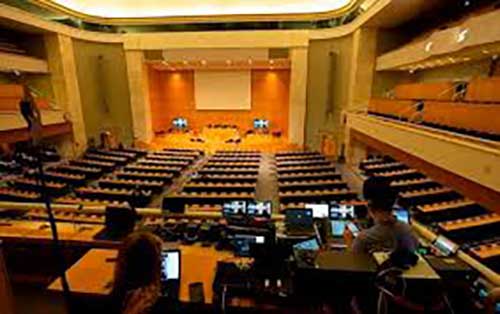
By Dr Laksiri Fernando
The 46th Session of the UN Human Rights Council started on 22 February morning with obvious hiccups. The Office, to mean the Office of the UN High Commissioner for Human Rights, finally decided to hold all sessions virtually online, only the President of the Council and the assistants in the high table sitting at the UN Assembly Hall in Geneva. The President, Ms. Nazhat Shammen Khan, Ambassador from Fiji in Geneva, wearing a saree, was graceful in the chair with empty seats surrounding.
In the opening session, the UN General Assembly President, UN General Secretary, UN High Commissioner for Human Rights, and Head of Foreign Affairs, Switzerland (as the host country), addressed remotely the session. In fact, there was no need for Switzerland to have a special place, as the UN is independent from any host country. Switzerland is fairly ok, however, if this tradition is followed, the UN General Assembly may have to give a special place to the US in New York.
Initial Addresses
UN General Secretary, Antonio Guterres’ address could have been quite exemplary if he gave a proper balance to the developed and developing countries. He talked about racism and fight against racism but did not mention where racism is overwhelmingly rampant (US and Europe) and what to do about it. Outlining the human rights implications of Covid-19 pandemic, he made quite a good analysis. It was nice for him to say, ‘human rights are our blood line (equality), our lifeline (for peace) and our frontline (to fight against violations).’ However, in the fight against violations, he apparently forgot about the ‘blood line’ or the ‘lifeline’ quite necessary not to aggravate situations through partiality and bias. He never talked about the importance of human rights education or promoting human rights awareness in all countries.
His final assault was on Myanmar. Although he did not call ‘genocide,’ he denounced the treatment of Rohingyas as ethnic cleansing without mentioning any terrorist group/s within. His call for the release of Aung San Suu Kyi and other civilian leaders undoubtedly should be a common call of all. However, he did not leave any opening for a dialogue with the military leaders or bring back a dialogue between Aung San and Min Aung, the military leader. With a proper mediation, it is not impossible. Calling for a complete overhaul as the young demonstrators idealistically claim might not be realistic.
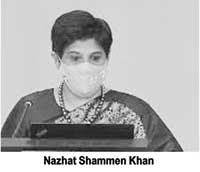 High Commissioner Michelle Bachelet’s address was brief and uncontroversial this time without mentioning any country or region. It is clear by now perhaps she is not the real author of the Report against Sri Lanka, but someone probably hired by the so-called core-group led by Britain. Her major points were related to the coronavirus pandemic trying to highlight some of the socio-economic disparities and imbalances of policy making that have emerged as a result. The neglect of women, minorities, and the marginalized sections of society were emphasized. But the poor was not mentioned. As a former medical doctor, she also opted to highlight some of the medical issues underpinning the crisis.
High Commissioner Michelle Bachelet’s address was brief and uncontroversial this time without mentioning any country or region. It is clear by now perhaps she is not the real author of the Report against Sri Lanka, but someone probably hired by the so-called core-group led by Britain. Her major points were related to the coronavirus pandemic trying to highlight some of the socio-economic disparities and imbalances of policy making that have emerged as a result. The neglect of women, minorities, and the marginalized sections of society were emphasized. But the poor was not mentioned. As a former medical doctor, she also opted to highlight some of the medical issues underpinning the crisis.
Then came the statements from different countries in the first meeting in the following order: Uzbekistan, Colombia, Lithuania, Afghanistan, Poland, Venezuela, Finland, Fiji, Moldova, Georgia, Kazakhstan, Equatorial Guinea, Vietnam, Belgium, and Morocco. The obvious purposes of these statements were different. Some countries were apparently canvassing for getting into the Human Rights Council at the next turn perhaps for the purpose of prestige. Some others were playing regional politics against their perceived enemies. This was very clear when Lithuania and Poland started attacking Russia.
But there were very sincere human rights presentations as well. One was the statement by the President of Afghanistan, Mohammad Ashraf Ghani. He outlined the devastating effects that Afghanistan had to undergo during the last 40 years, because of foreign interferences. The initial support to Taliban by big powers was hinted. His kind appeal was to the UN was to go ‘beyond discourse to practice’ giving equal chance to the poor and the developing countries to involve without discrimination.
Controversial Presentations
China’s Foreign Affairs Minister, Wang Yi, made his presentation almost at the end of the first day. This is apparently the first time that China had directly addressed the Human Rights Council. Beginning with outlining the devastating repercussions of the coronavirus pandemic he stressed that the world should face the challenges through ‘solidarity and cooperation.’ He broadened the concept to human rights solidarity and cooperation. His expressed views were quite different to the others, particularly to the Western ones.
He frankly said that what he expresses are the views of China on human rights without claiming those are absolute truths or forcing others to believe or implement them. There were four main concepts that he put forward before the member countries. First, he said, “We should embrace a human rights philosophy that centres on the people. The people’s interests are where the human rights cause starts and ends.” Second, he said, “we should uphold both universality and particularity of human rights. Peace, development, equity, justice, democracy, and freedom are common values shared by all humanity and recognized by all countries.” “On the other hand,” he said, “countries must promote and protect human rights in light of their national realities and the needs of their people.”
“Third,” he said, “we should systemically advance all aspects of human rights. Human rights are an all-encompassing concept. They include civil and political rights as well as economic, social, and cultural rights.” He then emphasized, “Among them, the rights to subsistence and development are the basic human rights of paramount importance.” Fourth, “we should continue to promote international dialogue and cooperation on human rights. Global human rights governance should be advanced through consultation among all countries.”
It was on the same first day before China, that the United Kingdom launched its barrage against several countries not sparing Sri Lanka. The Foreign Secretary, Dominic Raab, delivered the statement from top to bottom attacking alleged violating countries on human rights. But there was no mentioning of Israel for the repression of Palestinians or the systemic racism rampaging in the United States, including the 6 January attacks on the Capitol by extremist/terrorist groups.
His first sermon was on Myanmar without acknowledging the British atrocities or mismanagement of this poor and diverse country during the colonial period. He was quite jubilant over implementing sanctions and other restrictions over the country. Many sanctions, in my opinion, are extortions. Undoubtedly, Aung San Suu Kyi and other leaders should be released, and democracy restored. This is a task of the whole council and when one or two countries try to grab the credit, there can be obvious reservations of others.
His further scathing attacks were against Belarus, Russia, and China. Some appeared factually correct but not necessarily the approach or the motives genuine. The following is the way he came around Sri Lanka. He said,
“Finally, we will continue to lead action in this Council: on Syria, as we do at each session; on South Sudan; and on Sri Lanka, where we will present a new resolution to maintain the focus on reconciliation and on accountability.”
‘Action’ to him basically means repeatedly passing resolutions, of course imposing economic and other sanctions. He said, “as we do at each session”; like bullying poor or weak countries at each session. Can there be a resolution against Russia or China? I doubt it.
What would be the purpose of presenting a resolution against Sri Lanka? As he said, “to maintain the focus on reconciliation and on accountability.” This will satisfy neither the Tamil militants nor the Sinhalese masses. But it might satisfy the crafty Opposition (proxy of the defeated last government). This is not going to be based on any of the actual measures that Sri Lanka has taken or not taken on reconciliation or accountability. But based on the ‘Authoritarian and Hypocritical Report’ that some anti-Sri Lankans have drafted within the Office of the High Commissioner for Human Rights. This what I have discussed in my last article.
In this context, successful or not, the statement made by the Sri Lanka’s Minister of External Affairs, Dinesh Gunawardena, in rejecting any resolution based on the foxy Report of the Office of the UN High Commissioner for Human Rights, in my concerned opinion, is absolutely correct.
Opinion
President’s energy directives ignored by the Power Ministry: Another Point of View

Dr Tilak Siyambalapitiya
Dr Janaka Rathnasiri laments (The Island 19 Feb 2021) that the Power Ministry has ignored the President’s directive to draw 70% of energy from renewable sources by 2030. I saw the approved costs of electricity production for 2019, published by the Public Utilities Commission (PUCSL).
PUCSL has also approved the prices to sell electricity to customers. Although various customers pay at various “approved” prices, the average income from such “approved” prices in 2019 was Rs 17.02 per unit. It is not only the Ministry, according to Dr Rathnasiri, ignoring the President; PUCSL is also breaking the law, which says prices and approved costs should be equal.
 So there is already an illegal gap of Rs 21.59 minus 17.02 = Rs 4.57 per unit of electricity sold. If electricity prices are not to be increased, as stated by many in the government and PUCSL, let us say the following: Distribution costs should decrease by 0.57 Rs per unit. Generation costs should decrease by Rs 4.00 per unit.
So there is already an illegal gap of Rs 21.59 minus 17.02 = Rs 4.57 per unit of electricity sold. If electricity prices are not to be increased, as stated by many in the government and PUCSL, let us say the following: Distribution costs should decrease by 0.57 Rs per unit. Generation costs should decrease by Rs 4.00 per unit.
PUCSL also published the approved cost of purchasing or producing electricity from various sources for 2019. The actual energy values were different to what was approved, but let us stick to PUCSL approved figures:
I suggest Dr Rathnasiri fills-up the following table, to show how much electricity will cost in 2030 to produce and deliver, if the President’s 70% target is to be achieved and for PUCSL to abide by the law. Let us assume that electricity requirement in 2030 will be double that of 2019.
 Since PUCSL has to save Rs 4 from 13.92, the average selling price for energy should be Rs 13.92 minus 4.00 = Rs 9.92. With a target network loss of 7% (in 2019 it was 8.4%), the average cost of production has to be Rs 9.27 per unit. Eight cages have to be filled-up by Dr Rathnasiri.
Since PUCSL has to save Rs 4 from 13.92, the average selling price for energy should be Rs 13.92 minus 4.00 = Rs 9.92. With a target network loss of 7% (in 2019 it was 8.4%), the average cost of production has to be Rs 9.27 per unit. Eight cages have to be filled-up by Dr Rathnasiri.
In 2012, PUCSL approved the energy cost of electricity produced from coal power to be 6.33 Rs per kWh. In 2019, PUCSL approved 9.89 (56% increase). For renewable energy, it was 13.69 in 2012, and 19.24 in 2019 (a 40% increase, but double the price of electricity from coal fired generation). In 2012, rooftop solar was not paid for: only give and take, but now paid Rs 22, against Rs 9.89 from coal. There seems to be something wrong. The price reductions of renewable energy being promised, being insulated from rupee depreciation, are not happening? Either Sri Lanka must be paying too little for coal, or it may be renewable energy is severely over-priced?
On coal we hear only of some corruption every now and then; so Sri Lanka cannot be paying less than it costs, for coal.
Enough money even to donate
vaccines
 Another reason for the Ministry of Power to ignore the President’s directive may be the Ministry’s previous experience with similar Presidential directives. In 2015, the President at that time cancelled the Sampur coal-fired power plant, and the Ministry faithfully obliged. That President and that Prime Minister then played ball games with more power plants until they were thrown out of power, leaving a two-billion-dollar deficit (still increasing) in the power sector. Not a single power plant of any description was built.
Another reason for the Ministry of Power to ignore the President’s directive may be the Ministry’s previous experience with similar Presidential directives. In 2015, the President at that time cancelled the Sampur coal-fired power plant, and the Ministry faithfully obliged. That President and that Prime Minister then played ball games with more power plants until they were thrown out of power, leaving a two-billion-dollar deficit (still increasing) in the power sector. Not a single power plant of any description was built.
Where is this deficit? You do not have to look far. In the second table, replace 24.43 with 9.89, to reflect what would have happened if Sampur was allowed to be built. The value 12.79 will go down to 8.55, well below the target of Rs 9.27 per unit to produce. Not only would CEB and LECO report profits, but the government too could have asked for an overdraft from CEB to tide over any cash shortfalls in the treasury. All this with no increase in customer prices. Producers of electricity from renewable energy could enjoy the price of 19.24 Rs per unit. And that blooming thing on your rooftop can continue to enjoy Rs 22 per unit. The Minister of Power, whom Dr Rathnasiri wants to replace with an army officer, would have been the happiest.
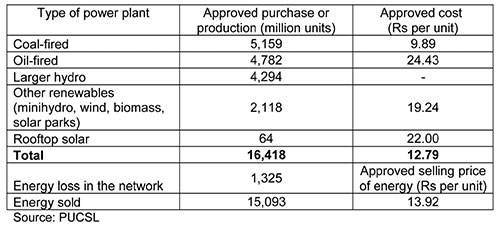 In the absence of Sampur (PUCSL’s letter signed by Chairman Saliya Mathew confirmed cancellation and asked CEB not to build it), PUCSL approved electricity to be produced at Rs 21.59 and sold at Rs 17.02 per unit. The annual loss would be Rs (21.59 – 17.02) x 15,093 = Rs 69 billion per year of approved financial loss. Sri Lanka has a Telecom regulator, an Insurance regulator, a Banking regulator, who never approve prices below costs. Sometime ago the telecom regulator asked the operators to raise the prices, when operators were proposing to reduce prices amidst a price war. But the electricity industry regulator is different: he approves costs amounting to 27% more than the price, not just once but, but continuously for ten long years !
In the absence of Sampur (PUCSL’s letter signed by Chairman Saliya Mathew confirmed cancellation and asked CEB not to build it), PUCSL approved electricity to be produced at Rs 21.59 and sold at Rs 17.02 per unit. The annual loss would be Rs (21.59 – 17.02) x 15,093 = Rs 69 billion per year of approved financial loss. Sri Lanka has a Telecom regulator, an Insurance regulator, a Banking regulator, who never approve prices below costs. Sometime ago the telecom regulator asked the operators to raise the prices, when operators were proposing to reduce prices amidst a price war. But the electricity industry regulator is different: he approves costs amounting to 27% more than the price, not just once but, but continuously for ten long years !
That is 370 million dollars per year as of 2019, the economy is spending, and for years to come, to burn oil (and say we have saved the environment). Did the Minister of Health say we are short of 160 million dollars to buy 40 million doses of the vaccine? Well, being a former Minister of Power, she now knows which Presidential “order” of 2015 is bleeding the economy of 370 million dollars per year, adequate to buy all vaccines and donate an equal amount to a needy country.
Prices are the production costs approved by PUCSL for 2019. The selling price approved by the same PUCSL was Rs 9.27 per unit.
Opinion
Confusion on NGOs and NSOs in Sri Lanka
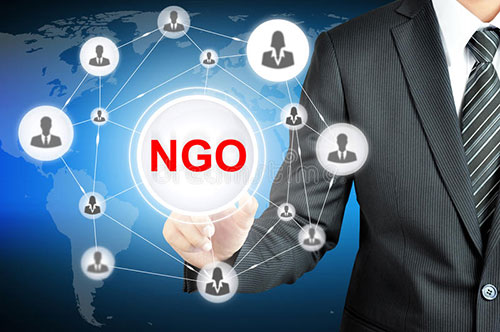
If you listen to politicians and journalists here, you will hear of that curious creature rajya novana sanvidane, a Non-State Organization (NSO). Where do you get them? In the uninstructed and dead minds of those who use those terms. In the real world, where politicians and journalists have developed minds, there are Non-Governmental Organizations (NGO). The United Nations is an organization set up by state parties, not by governments. It is true that agents of states, governments, make the United Nations work or fail. Governments may change but not the states, except rarely. When Eritrea broke away from Ethiopia, a new state was formed and was so recognised by the United Nations. However, the LTTE that tried to set up another state was crushed by the established state that it tried to break away from, and the UN had nothing to do with them.
This entirely unnecessary confusion, created out of ignorance, is so destructive that organizations completely loyal to the existing state, are made to be traitorous outfits, for they are ‘non-state organizations’ within the state. There are citizens of each state, but no citizens of any government. Government is but an instrument of the state. In most states there are organizations, neither of the state nor of government: religious organizations including churches. But none of them is beyond the pale of the state.
Those that speak of rajya novana sanvidane give that name partly because they have no idea of the origin of non-governmental organizations. NGOs came into the limelight, as donor agencies, noticed that some governments, in East Africa, in particular, did not have the capacity and the integrity to use the resources that they provided. They construed, about 1970, that NGOs would be a solution to the problem. Little did they realize that some NGOs themselves would become dens of thieves and brigands. I have not seen any evaluation of the performance of NGOs in any country. There was an incomplete essay written by Dr. Susantha Gunatilleka. NGOs are alternatives to the government, not to the state.
Our Constitution emphatically draws a distinction between the government and state, and lays down that the President is both Head of Government and Head of State (Read Article 2 and Article 30 of the Constitution.) It is as head of state that, he/she is the Commander of the Armed Forces, appoints and receives ambassadors and addresses Parliament annually, when a prorogued Parliament, reconvenes. He/she presides over the Cabinet as head of government. The distinction is most clear, in practice, in Britain where Queen Elizabeth is the head of state and Boris Johnson is the Prime Minister and head of government. However, in principle, Johnson is the Queen’s First Minister appointed by the sovereign, and resigns by advising her of his decision to do so.
In the US and in India the term ‘state’ has special significance. In India there is a ‘rajya sabha’ (the Council of States) whose members represent constituent States and Union Territories. Pretty much the same is true of the United States. In the US, executive power is vested in the President and heads the administration, government in our parlance. The Head of State does not come into the Constitution but those functions that one associates with a head of state are in the US performed by the President of the Republic. The US President does not speak of my state (mage rajaya) but of my administration, (mage anduva). Annually, he addresses Congress on the State of the Union. Our present President must be entirely familiar with all this, having lived there as a citizen of the US for over a decade. It is baffling when someone speaks of a past state as a traitor to that same state. It is probable that a government was a traitor to the state. ‘Treason against the United States, shall consist only in levying war against them, or in adhering to their (States’) enemies, giving them aid and comfort’. That a state was a traitor to the same state is gobbledygook.
Apart from probable confusion that we spoke of in the previous paragraph, it is probable that a president and other members of a government, including members of the governing party here, find it grandiloquent to speak of his/her/their state (mage/ape rajaya), rather than my government (mage anduva) or Sirisena anduva’ and not Sirisena state; it was common to talk of ‘ape anduva’ in 1956; politicians in 1956 were far more literate then than they are now.
When translating from another language, make sure that you understand a bit of the history of the concept that you translate. A public school in the US is not the same as a public school in the UK.
MAHADENAMUTTA









